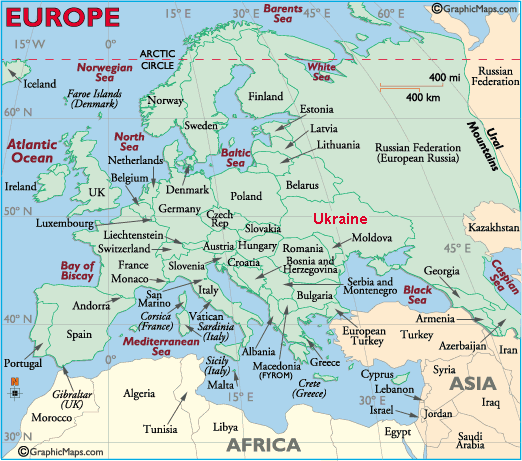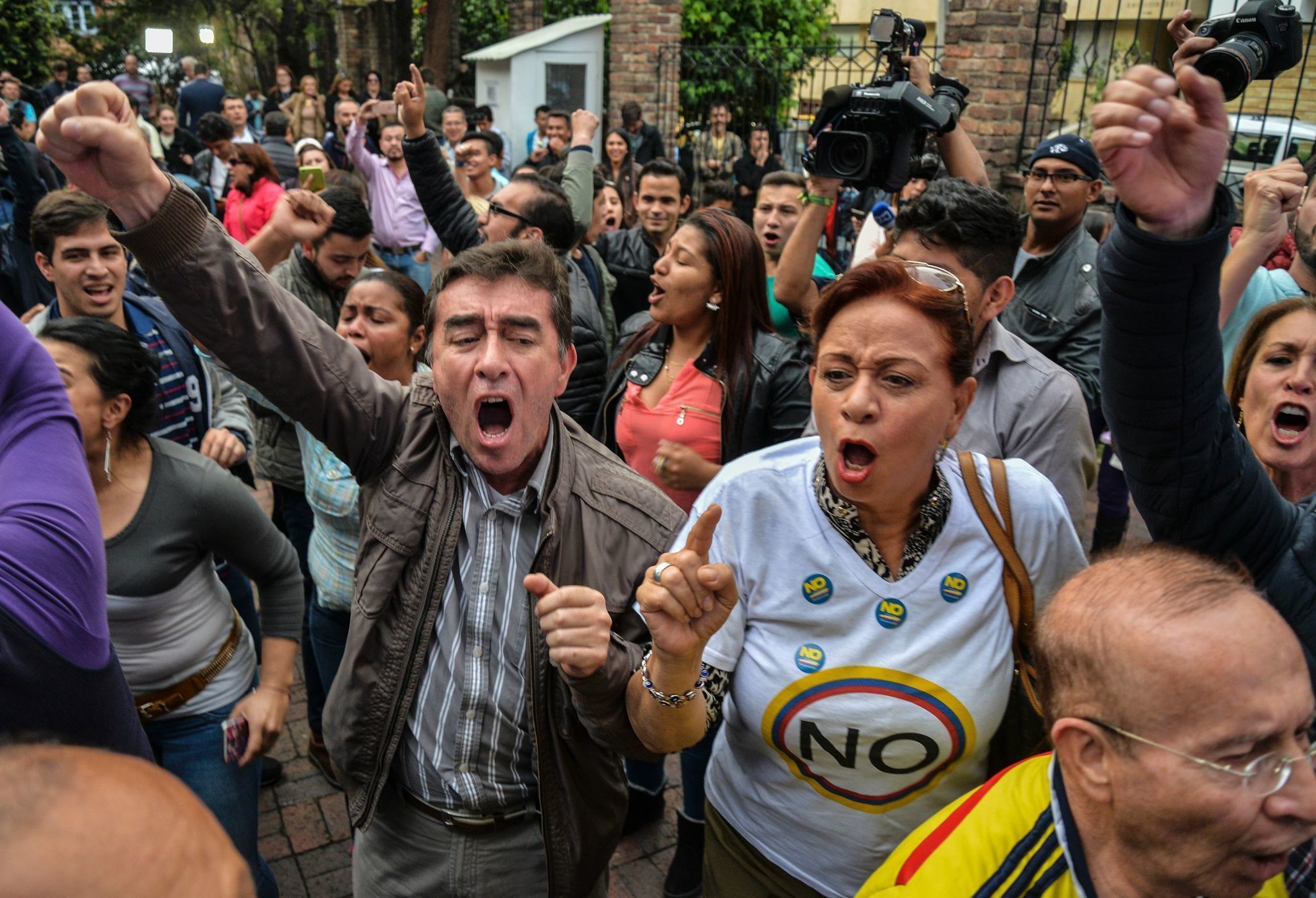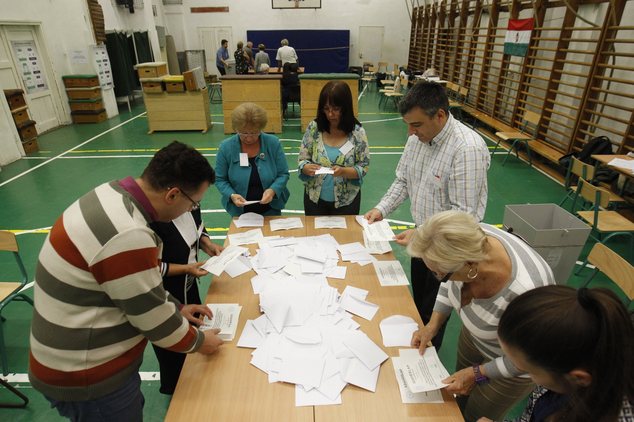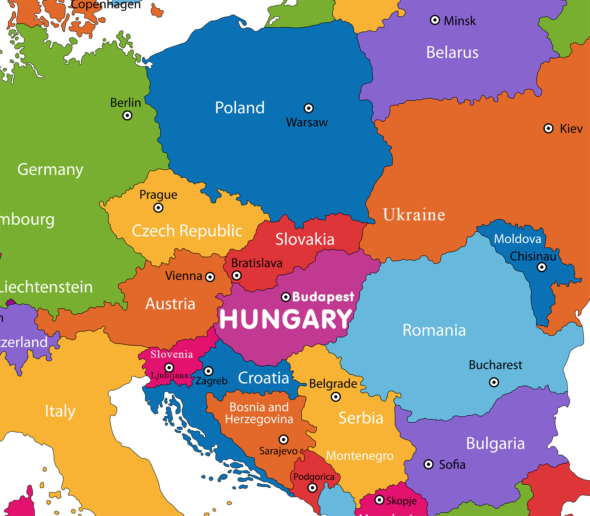News from Ukraine, Colombia and Hungary
Tuesday's World Events — Posted on October 4, 2016
UKRAINE – Ukraine marks infamous Babi Yar massacre of 34,000 Jews by Nazis on 75th anniversary
(Japan Times) KIEV — Ukraine on Thursday marked the 75th anniversary of the Babi Yar massacre, one of the most infamous mass slaughters of World War II.
Babi Yar, a ravine in Kiev, is where nearly 34,000 Jews were killed within 48 hours in 1941 when the city was under Nazi occupation. The killing was carried out by SS troops along with local collaborators.
President Petro Poroshenko visited the Babi Yar monument on Thursday in a small commemoration that included people laying flowers. A larger ceremony was scheduled for the evening.
Poroshenko tweeted that “we Ukrainians very well understand the grief of the Jews and take it as our own.”
World Jewish Congress President Ronald S. Lauder described Babi Yar as “one of the most infamous pieces of ground in the entire world.” He also noted that some Ukrainians had collaborated with the Nazis in the massacre. “While Babi Yar was organized by the Nazis, there were willing helpers in the Ukrainian militia,” he said, praising others who had helped save Jews. “There were Ukrainians who risked their lives to save their Jewish neighbors.”
Lauder also hailed the Jewish revival that Ukraine has seen in recent years. “We are here in Kiev for one more important reason: We are here to celebrate the rebirth of a strong Jewish community here in Ukraine,” he said. “This rebirth is nothing short of a miracle.”
Kiev resident Volodymyr Pogrilchuk said the tragedy of Babi Yar has haunted him ever since. “I was almost 6 years old at that time and it was something horrible,” he said “It was a nightmare. And I come here every year.”
The slaughter was one of the worst single massacres of the Holocaust. …
President Poroshenko spoke at the commemoration, saying…“No Ukrainian has the right to forget this tragedy. The lesson of Babi Yar is a reminder of the frightening price of political and moral nearsightedness.” Poroshenko made his remarks to a largely Jewish audience at a temporary stadium in Kiev’s Babi Yar park where the commemoration was held. The site encompasses a ravine on the city’s outskirts, where German SS troops systematically killed assembled Jews with machine guns on Sept. 29 and 30, 1941. “It’s a reminder that indulging an aggressor simply builds his appetite,” the president said.

…Members of the Ukrainian Insurgent Army (UPA) initially collaborated with Hitler’s generals because they felt the Nazis could help them win independence from the Soviet Union’s even-more-hated Stalin. …
The Nazis and local auxiliaries exterminated the Jews between Sept. 29 and 30 of 1941 as they blitzed their way toward Moscow and captured major cities on the western Soviet flank.
The last survivor of that tragedy still alive in Kiev told AFP that Jews comprised about a quarter of the city’s 800,000-strong population at the time. About 100,000 Jewish people live in the city today out of a population of around 2.8 million
…Babi Yar is also rarely mentioned by locals. But the horror of those 48 hours are still vividly etched in the memories of survivors such as Raisa Maistrenko, who was only 3 years old when her 18 relatives failed to return from the ravine. Just 29 people managed to escape execution by either falling into the mass grave before being shot in the back or by wearing crosses to hide their true religion.
“All the Jews decided to go because they thought they would be evacuated by train as the railway station was nearby. Nobody could possibly assume there would be a mass execution,” she recalled in hushed tones. “We heard the shooting behind us, but (my) granny — she kept holding me — did not look back and kept running until she fell exhausted among the graves in a nearby cemetery.”
Maistrenko said they were hiding there until sunset before finding their way back home under the cover of darkness. There — to their relief — no one reported them to the Nazis.
COLOMBIA – Voters Reject What They See As Bad Peace Deal With FARC Rebels
(The Wall Street Journal) BOGOTÁ, Colombia — On Sunday, voters narrowly rejected a peace accord between President Juan Manuel Santos and a Marxist rebel group that would have ended 52 years of conflict, a startling outcome that thrusts this country into uncertainty.
…The vote in Colombia came barely a month after the government and the Marxist Armed Revolutionary Forces of Colombia, or FARC, concluded four years of peace negotiations in Cuba. Polls had earlier shown the “Yes” vote comfortably winning the referendum.

Colombian voters reject peace deal between the government and FARC rebels (LA Times)
“I am the first to recognize this result,” Mr. Santos said in a short televised address on Sunday evening, flanked by his peace negotiators. Of his policy toward the rebels, though, he reiterated, “I won’t surrender. I will continue to look for peace until the last minute of my term.”
The deep antipathy [hatred] Colombians hold toward the FARC propelled the “No” vote, with [those who opposed] the accord warning that Mr. Santos was selling out to the guerrillas. …
With 99.9% of votes counted, “No” votes (totaling more than 6.4 million) outnumbered “Yes” votes by fewer than 54,000.
The “No” vote won throughout most of central Colombia, including heavily populated Antioquia, an economic engine for Colombia, and other interior states deeply affected by guerrilla violence. Bogotá, with eight million people, voted “Yes” and so did other states in the southwest where conflict once raged. But the size of the vote in those regions wasn’t enough to turn back seething anger against FARC and Mr. Santos’s accord. After the results of the vote were released, half the country was stunned, while the other half celebrated, with drivers honking horns on city streets.
President Santos said the vote wouldn’t affect a cease-fire that has been in place with FARC, and that on Monday (Oct. 3) he would convene a meeting with all political forces in Colombia to discuss how to proceed. Although he had said he wouldn’t renegotiate should “No” win, Mr. Santos sounded [as if he might not hold to his position] on Sunday night. …

President Santos’s loss is a victory for his predecessor, former President Álvaro Uribe, who marshaled his followers by asserting that the accord would permit FARC to install a communist system in this country of 49 million.
Mr. Uribe, whose father was murdered by the FARC rebels, said in a late-night televised speech that his movement wants to “be part of a grand national pact, so that they hear our reasons,” adding, “We know that our compatriots who said yes will receive our message, that they’ll hear us and we’ll hear them.”
The Santos administration had touted the development and economic-growth potential that peace would bring in a country ravaged by a drug-fueled war, noting that one of the points in the accord amounted to a Marshall Plan [whereby Colombia would be given money from allies]. This year, the Obama administration had pledged $450 million to aid the postconflict process, one of several commitments made by Colombia’s allies. Mr. Santos’s accord also had the support of Latin America, the EU and the Vatican.
FARC, which spent more than five decades trying to topple the Colombian state, had in the negotiations abandoned many of the demands it had long fought for, such as changing the country’s capitalist system, barring foreign ownership of land and implanting radical land overhauls.
But benefits for ex-combatants stipulated in the peace accord—including seats in Congress for guerrilla commanders and leniency in tribunals for those accused of atrocities—prompted many Colombians to reject the deal.
“After all of the damage and violence that the guerrillas have caused, they wanted us to treat them like prizewinners,” said 46-year-old maintenance worker Dairo Aguilar, whose family was forced to the capital from their village in southern Colombia by the conflict. He voted against the deal.
Likewise, Patricia Alarcon said she voted “No” because she remembers how her family had to flee their home in Colombia’s east, fearing that her six brothers would be forcibly recruited by the rebels. “Even having too many boys in the family was a risk,” the 35-year-old homemaker recalled, holding her toddler son outside a voting center. “What kind of example would we be setting for the future if we just let these people go unpunished?”
Mr. Santos banked his presidency on ending a conflict that since 1964 left more than 220,000 dead and forced millions of poor farmers off their land. A victory for the “No” campaign would lead to a resurgence in conflict, Mr. Santos had warned, irking many in Colombia who said the warnings amounted to a scare tactic.
FARC leaders have been more ambivalent in public comments. In a recent interview, a guerrilla who used the name Paula Saenz said the rejection of the accord wouldn’t mean war, at least not yet. “It’s not like we will begin to blow up bridges,” she said, although she shook her head when asked just what the guerrillas might do.
HUNGARY – Hungary voters reject EU migrant-resettlement plan, but low turnout invalidates results
(CNN) – Hungarians voted Sunday to reject a forced European Union refugee resettlement plan, but failed to turn out in sufficient numbers to make the referendum legally binding.
Voter turnout was 43.7%, short of the 50% participation required to make the referendum valid under Hungarian law.

Members of a local election commission start counting votes after the polling station closed in the first district of Budapest, Hungary, Sunday, Oct. 2, 2016. Hungarians voted Sunday in a referendum called by Prime Minister Viktor Orban’s government to bolster its opposition to any future, mandatory European Union quotas for accepting relocated asylum seekers. (Zsolt Szigetvary/MTI via AP)
Gulyás Gergely, the Vice-President of Hungary’s ruling party, FIDESZ, … said that more than 90% of those who voted supported Prime Minister Viktor Orban’s “No” position.
In a Sunday evening television address, Prime Minister Orban said the European Union cannot force migration policies on Hungary and vowed to fight any efforts to do so.
“Can a democratic community [the EU] force its will to a member where 92% [of the voters] is against it? I promise, I will do everything so this can never ever happen,” he said.
Earlier on Sunday, Orban told reporters that his government would “start to negotiate the modification of the Hungarian constitution” if the referendum fell short of the 50% turnout needed to make it valid.

Orban had spearheaded a campaign asking Hungarians to reject EU migrant quotas for the country. …”We lose our European values and identity the way frogs are cooked in slowly heating water,” Orban said Friday. “Quite simply, slowly there will be more and more Muslims, and we will no longer recognize Europe. What we have seen so far from the people’s migration have only been warmup rounds. The real battle is yet to come,” he added.
Hungary has recently erected a razor-wire fence that runs the entire length of the country’s borders with Serbia and Croatia.
Migrants from the Middle East and southeast Asia often cross the Mediterranean and try to go through Greece, Macedonia, Serbia, Hungary and Austria in an attempt to reach Germany or other European countries known to give refugees [more benefits including food, places to live, education and medical care].
(The news briefs above are from wire reports and staff reports posted at Japan Times on Sept. 30, The Wall Street Journal and CNN on October 3.)
Background
UKRAINE - The Babi Yar massacre:
- The German army took Kiev on September 19, 1941 and special SS squads prepared to carry out Nazi leader Adolf Hitler’s orders to exterminate all Jews that Soviet officials found there. Beginning on September 29, more than 30,000 Jews were marched in small groups to the Babi Yar ravine to the north of the city, ordered to strip naked, and then machine-gunned into the ravine. The massacre ended on September 30, and the dead and wounded alike were covered over with dirt and rock.
- Between 1941 and 1943, thousands more Jews, Soviet officials, and Russian prisoners of war were executed at the Babi Yar ravine in a similar manner. As the German armies retreated from the USSR, the Nazis attempted to hide evidence of the massacres by exhuming the bodies and burning them in large pyres. Numerous eyewitnesses and other evidence, however, attest to the atrocities at Babi Yar, which became a symbol of Jewish suffering in the Holocaust. (from history .com)
From the US Holocaust Memorial Museum website:
- On September 29-30, 1941, SS and German police units and their auxiliaries, under guidance of members of Einsatzgruppe (mobile killing unit) C, murdered the Jewish population of Kiev at Babi Yar, a ravine northwest of the city. This was one of the largest mass murders at an individual location during World War II. As the victims moved into the ravine, Einsatzgruppe detachments shot them in small groups. According to reports by the Einsatzgruppe to headquarters, 33,771 Jews were massacred in two days. In the months following the massacre, German authorities stationed at Kiev killed thousands more Jews at Babi Yar, as well as non-Jews including Roma (Gypsies), Communists, and Soviet prisoners of war. It is estimated that some 100,000 people were murdered at Babi Yar.
- The Soviet army liberated Kiev on November 6, 1943.
COLOMBIA: FARC:
- FARC is a guerrilla organization, self-proclaimed Marxist-Leninist. The FARC is considered a terrorist group by the Colombian government, the United States, Canada, the Latin American Parliament, and the European Union. (from wikipedia.org)
- The FARC continues to wage a war of words devoted to Marxist principles, despite the fact that many of its battles are fought with the less idealistic motive of controlling the illicit drug industry. (from tkb.org)
- FARC is responsible for most of the ransom kidnappings in Colombia; the group targets wealthy landowners, foreign tourists, and prominent international and domestic officials. FARC stepped up terrorist activities against infrastructure in cities before Colombia’s May 2002 presidential election.
- The FARC has long used violence, kidnappings, and extortion as sources of leverage and income.
- Colombia's National Center for Historical Memory estimates that guerrilla groups kidnapped twenty-five thousand people (PDF) between 1970 and 2010.
- More than ten thousand people, including nearly four thousand civilians, have been killed or maimed in landmine explosions, most of which were planted by the FARC, according the Colombian government.
- In the early 2000s Colombia supplied as much as 90 percent of the world's cocaine, and the production, taxation, and trafficking of illicit narcotics provided the FARC with much of its revenue. (from cfr.org)
(Read about FARC at cfr.org/publication/9272/.)
From the WSJ article above:
- The result of Sunday’s vote emboldens Mr. Santos’s detractors, led by former President Alvaro Uribe, now a senator.
- He had campaigned saying the peace deal could be renegotiated with stricter penalties for rebels accused of war atrocities. Mr. Uribe, whose heavy military offensive against FARC during much of the past decade decimated the guerrilla group, remains highly popular in Colombia.
- Indeed, many here believe that Mr. Santos should have finished off what Mr. Uribe began, though military experts, including generals in the army here, were supportive of the negotiations and saw the accords as the best way to end the conflict.
- Sen. Daniel Cabrales, a former cattle farmer allied with Mr. Uribe, said the victory for the “No” side means “the negotiation table doesn’t get lifted, it gets reoriented.”
- However, it remains unclear how the government and FARC would redefine terms for future negotiations after both sides had exhausted much of their political capital working on the 297-page agreement.
- Juan Pablo Vega, a rancher in northwest Colombia, a region marked by FARC kidnappings, summed up the opposition to the accords, saying he didn’t want to see the rebels in politics after having committed so many atrocities.
HUNGARY
What is the difference between a Migrant and a Refugee?
Prime Minister Orban opposes the EU’s handling of the migration crisis and has said in the past that the link between migration and terrorism is as “plain as day.”
In September 2015, Prime Minister Orbán said Europe is in the grip of madness over immigration and refugees, and argued that he was defending European Christianity against a Muslim influx. He wrote,
“Everything which is now taking place before our eyes threatens to have explosive consequences for the whole of Europe. Europe’s response is madness. We must acknowledge that the European Union’s misguided immigration policy is responsible for this situation. Irresponsibility is the mark of every European politician who holds out the promise of a better life to immigrants and encourages them to leave everything behind and risk their lives in setting out for Europe. If Europe does not return to the path of common sense, it will find itself laid low in a battle for its fate.”
Prime Minister Orban also said, ”Those arriving have been raised in another religion, and represent a radically different culture. Most of them are not Christians, but Muslims… This is an important question, because Europe and the European identity is rooted in Christianity.
Do you think it is wrong to say that you want to protect the culture of your country? Explain your answer.
CHALLENGE: Read the commentary “Eastern Europe: The Last Barrier between Christianity and Islam” which includes the following:
Hungarian Prime Minister Viktor Orbán is the Eastern nemesis of the European elite. No one else in Europe except him speaks about defending “Christianity.”
“Those arriving have been raised in another religion, and represent a radically different culture. Most of them are not Christians, but Muslims… This is an important question, because Europe and the European identity is rooted in Christianity.” — Hungarian Prime Minister Viktor Orbán.
The last chance to save Europe’s roots might well come from the former communist members of the EU — those who defeated the Ottomans in 1699 and now feel culturally threatened by their heirs.
Do you agree with the assertions made by the writer? Why or why not?
